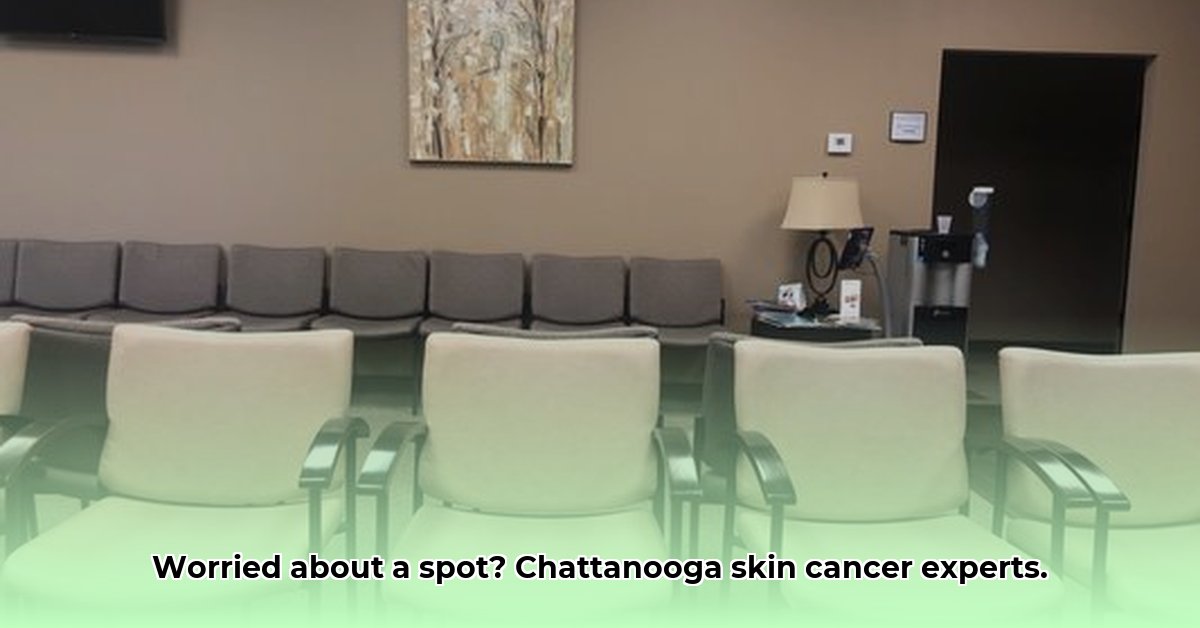This guide connects you with top skin cancer clinics and doctors in Chattanooga, providing essential information about skin cancer detection, treatment, and prevention. Whether you’re due for a checkup, have noticed a concerning spot, or simply want to learn more about protecting your skin, this resource is here to empower you.
Top Chattanooga Skin Cancer Clinics and Doctors
Finding the right dermatologist can feel overwhelming. To help you in your search, we’ve compiled a list of respected dermatologists and clinics in Chattanooga specializing in skin cancer care:
| Clinic/Doctor | Specialties | Location & Contact | Patient Reviews | Key Highlights | Call to Action |
|---|---|---|---|---|---|
| Chattanooga Skin & Cancer Clinic | Skin cancer diagnosis & treatment, Mohs surgery | [Address], [Phone], [Website] | Generally positive, some mention longer wait times. | Provides comprehensive skin cancer services, from checkups to advanced treatment. | [Book an appointment] |
| Skin Cancer & Cosmetic Dermatology Center | Mohs surgery, cosmetic dermatology | [Address], [Phone], [Website] | Mostly excellent, some appreciate the combined cosmetic options; occasional comments about wait times. | Known for Mohs surgery expertise and also offers cosmetic procedures. | [Visit Website] |
| Chattanooga Dermatology | General dermatology, skin cancer screenings | [Address], [Phone], [Website] | Very positive, patients highlight friendly staff and convenient location. | Offers a broad range of dermatological services, including skin cancer screenings. | [Book an appointment] |
| Dr. Mark Tusa | Mohs surgery, skin cancer surgery | [Address], [Phone], [Website] | Highly rated for surgical expertise. | Specializes in surgical treatments for skin cancer. | [Contact Dr. Tusa] |
| Dr. Samuel Banks | Skin cancer diagnosis, medical dermatology | [Address], [Phone], [Website] | Described as caring and knowledgeable; some mention longer appointment times. | Focuses on the medical management of skin cancer, offering non-surgical options. | [Make an Appointment] |
| Dr. Frank Reynolds | Pediatric dermatology, skin cancer screenings | [Address], [Phone], [Website] | Excellent reviews, especially from parents praising his approach with children. | Specializes in pediatric dermatology, including skin cancer screenings for children. | [Learn More] |
| Erlanger Dermatology – Downtown | General dermatology, skin cancer treatment | [Address], [Phone], [Website] | Part of the Erlanger Health System, patients generally appreciate access to wider medical resources. | Offers a range of dermatological services, including skin cancer treatment, within a larger hospital system. | [Find a Doctor] |
| Uderm Dermatology (near Chattanooga) | Mohs surgery | Address [Phone], [Website] | Highly specialized in Mohs surgery. Dr. Miller provides comprehensive care. | Known for expertise and experience in performing Mohs surgery | [Visit Website] |
Important Note: This information is for educational purposes and does not constitute medical advice. Always consult with a qualified healthcare professional. Insurance coverage varies; verify directly with each clinic. Patient reviews are summarized and do not represent endorsements.
Understanding Skin Cancer
Skin cancer arises from the uncontrolled growth of skin cells. Several types exist, each with varying characteristics and levels of severity.
Types of Skin Cancer
- Basal Cell Carcinoma: The most common type, often appearing as pearly or waxy bumps. It grows slowly and rarely spreads.
- Squamous Cell Carcinoma: Appears as firm, red nodules or scaly patches. More likely to spread than basal cell carcinoma but still treatable.
- Melanoma: The most serious form, appearing as a changing mole or a new, unusual spot. Early detection is crucial due to its higher risk of spreading.
(Include images of each type)
Symptoms and Early Detection
Regular skin self-exams are vital. Use the ABCDEs of melanoma detection:
- Asymmetry: One half of a mole doesn’t match the other.
- Border: Irregular, notched, or blurred edges.
- Color: Uneven color distribution, multiple shades (brown, black, tan, red, white, or blue).
- Diameter: Larger than 6mm (about a pencil eraser).
- Evolving: Any change in size, shape, color, elevation, or other traits.
Risk Factors
Sun exposure is a primary risk factor. Other factors include:
- Fair skin
- Family history of skin cancer
- Weakened immune system
- History of sunburns, particularly blistering sunburns in childhood
Skin Cancer Treatment Options
Treatment depends on the type, stage, size, and location of skin cancer. Some common options include:
- Mohs Surgery: Precisely removes thin layers of cancerous tissue until only healthy tissue remains, minimizing scarring.
- Surgical Excision: Removes the tumor and a margin of surrounding skin.
- Radiation Therapy: Uses high-energy radiation to kill cancer cells.
- Cryosurgery: Freezes and destroys cancerous tissue using liquid nitrogen.
- Topical Medications: Creams or lotions applied directly to the affected area for superficial cancers or precancerous lesions.
Preventing Skin Cancer
Protecting yourself from excessive sun exposure is the best defense against skin cancer:
- Sunscreen: Use a broad-spectrum sunscreen with SPF 30 or higher daily, reapplying every two hours, especially after swimming or sweating.
- Protective Clothing: Wear wide-brimmed hats, long-sleeved shirts, and pants when in the sun. Seek clothing with a UPF rating.
- Seek Shade: Limit direct sun exposure, especially between 10 a.m. and 4 p.m.
Additional Resources
- American Academy of Dermatology
- The Skin Cancer Foundation
- Find local support groups by searching online for “skin cancer support groups Chattanooga.”
This comprehensive guide is designed to empower you with the knowledge and resources to prioritize your skin health and make informed decisions about your care. Remember, early detection and professional consultation are essential for effectively managing and preventing skin cancer. If you have any concerns, consult a dermatologist promptly.
- Glass Storage Containers With Glass Lids That Lock for Freshness - February 2, 2026
- Locking Glass Food Storage Containers for Organized and Fresh Meals - February 1, 2026
- Borosilicate Glass Food Storage for Freshness and Organization - January 31, 2026










